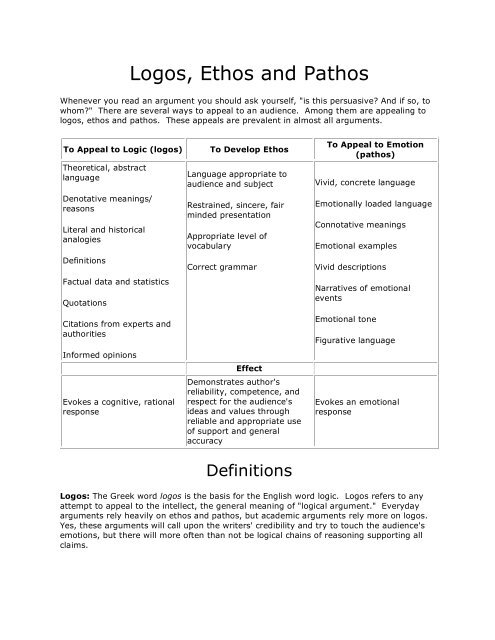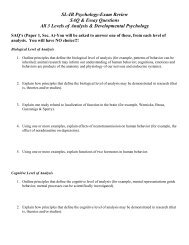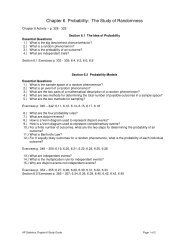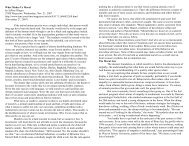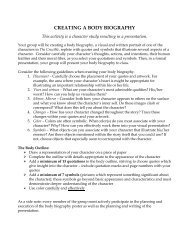Logos, Ethos and Pathos
Logos, Ethos and Pathos
Logos, Ethos and Pathos
You also want an ePaper? Increase the reach of your titles
YUMPU automatically turns print PDFs into web optimized ePapers that Google loves.
<strong>Logos</strong>, <strong>Ethos</strong> <strong>and</strong> <strong>Pathos</strong><br />
Whenever you read an argument you should ask yourself, "is this persuasive And if so, to<br />
whom" There are several ways to appeal to an audience. Among them are appealing to<br />
logos, ethos <strong>and</strong> pathos. These appeals are prevalent in almost all arguments.<br />
To Appeal to Logic (logos)<br />
Theoretical, abstract<br />
language<br />
Denotative meanings/<br />
reasons<br />
Literal <strong>and</strong> historical<br />
analogies<br />
Definitions<br />
Factual data <strong>and</strong> statistics<br />
Quotations<br />
To Develop <strong>Ethos</strong><br />
Language appropriate to<br />
audience <strong>and</strong> subject<br />
Restrained, sincere, fair<br />
minded presentation<br />
Appropriate level of<br />
vocabulary<br />
Correct grammar<br />
To Appeal to Emotion<br />
(pathos)<br />
Vivid, concrete language<br />
Emotionally loaded language<br />
Connotative meanings<br />
Emotional examples<br />
Vivid descriptions<br />
Narratives of emotional<br />
events<br />
Citations from experts <strong>and</strong><br />
authorities<br />
Informed opinions<br />
Evokes a cognitive, rational<br />
response<br />
Effect<br />
Demonstrates author's<br />
reliability, competence, <strong>and</strong><br />
respect for the audience's<br />
ideas <strong>and</strong> values through<br />
reliable <strong>and</strong> appropriate use<br />
of support <strong>and</strong> general<br />
accuracy<br />
Emotional tone<br />
Figurative language<br />
Evokes an emotional<br />
response<br />
Definitions<br />
<strong>Logos</strong>: The Greek word logos is the basis for the English word logic. <strong>Logos</strong> refers to any<br />
attempt to appeal to the intellect, the general meaning of "logical argument." Everyday<br />
arguments rely heavily on ethos <strong>and</strong> pathos, but academic arguments rely more on logos.<br />
Yes, these arguments will call upon the writers' credibility <strong>and</strong> try to touch the audience's<br />
emotions, but there will more often than not be logical chains of reasoning supporting all<br />
claims.
<strong>Ethos</strong>: <strong>Ethos</strong> is related to the English word ethics <strong>and</strong> refers to the trustworthiness of the<br />
speaker/writer. <strong>Ethos</strong> is an effective persuasive strategy because when we believe that the<br />
speaker does not intend to do us harm, we are more willing to listen to what s/he has to<br />
say. For example, when a trusted doctor gives you advice, you may not underst<strong>and</strong> all of<br />
the medical reasoning behind the advice, but you nonetheless follow the directions because<br />
you believe that the doctor knows what s/he is talking about. Likewise, when a judge<br />
comments on legal precedent audiences tend to listen because it is the job of a judge to<br />
know the nature of past legal cases.<br />
<strong>Pathos</strong>: <strong>Pathos</strong> is related to the words pathetic, sympathy <strong>and</strong> empathy. Whenever you<br />
accept an claim based on how it makes you feel without fully analyzing the rationale behind<br />
the claim, you are acting on pathos. They may be any emotions: love, fear, patriotism,<br />
guilt, hate or joy. A majority of arguments in the popular press are heavily dependent on<br />
pathetic appeals. The more people react without full consideration for the WHY, the more<br />
effective an argument can be. Although the pathetic appeal can be manipulative, it is the<br />
cornerstone of moving people to action. Many arguments are able to persuade people<br />
logically, but the apathetic audience may not follow through on the call to action. Appeals<br />
to pathos touch a nerve <strong>and</strong> compel people to not only listen, but to also take the next step<br />
<strong>and</strong> act in the world.<br />
<strong>Logos</strong><br />
Examples of <strong>Logos</strong>, <strong>Ethos</strong> <strong>and</strong> <strong>Pathos</strong><br />
Let us begin with a simple proposition: What democracy requires is public debate, not<br />
information. Of course it needs information too, but the kind of information it needs can be<br />
generated only by vigorous popular debate. We do not know what we need to know until<br />
we ask the right questions, <strong>and</strong> we can identify the right questions only by subjecting our<br />
ideas about the world to the test of public controversy. Information, usually seen as the<br />
precondition of debate, is better understood as its byproduct. When we get into arguments<br />
that focus <strong>and</strong> fully engage our attention, we become avid seekers of relevant information.<br />
Otherwise, we take in information passively--if we take it in at all.<br />
<strong>Ethos</strong><br />
Christopher Lasch, "The Lost Art of Political Argument"<br />
My Dear Fellow Clergymen: While confined here in Birmingham city jail, I came across your<br />
recent statement calling my present activities "unwise <strong>and</strong> untimely."...Since I feel that you<br />
are men of genuine good will <strong>and</strong> that your criticisms are sincerely set forth, I want to try to<br />
answer your statement in what I hope will be patient <strong>and</strong> reasonable in terms.<br />
I think I should indicate why I am here in Birmingham, since you have been influenced<br />
by the view which argues against "outsiders coming in."...I, along with several members of<br />
my staff, am here because I was invited here. I am here because I have organizational ties<br />
here.
But more basically, I am in Birmingham because injustice is here. Just as the prophets<br />
of the eighth century B.C. left their villages <strong>and</strong> carried their "thus saith the Lord" far<br />
beyond the boundaries of their home towns, <strong>and</strong> just as the Apostle Paul left his village of<br />
Tarsus <strong>and</strong> carried the gospel of Jesus Christ to the far corners of the Greco-Roman world,<br />
so am I compelled to carry the gospel of freedom beyond my own home town. Like Paul, I<br />
must constantly respond to the Macedonian call for aid.<br />
<strong>Pathos</strong><br />
Martin Luther King, Jr. "Letter from Birmingham Jail"<br />
This is the lesson: Never give in. Never give in. Never, never, never, never--in nothing,<br />
great or small, large or petty--never give in, except to convictions of honour <strong>and</strong> good<br />
sense. Never yield to force. Never yield to the apparently overwhelming might of the<br />
enemy. We stood all alone a year ago, <strong>and</strong> to many countries it seemed that our account<br />
was closed, we were finished. All this tradition of ours, our songs, our School history, this<br />
part of the history of this country, were gone <strong>and</strong> finished <strong>and</strong> liquidated. Very different is<br />
the mood today. Britain, other nations thought, had drawn a sponge across her slate. But<br />
instead our country stood in the gap. There was no flinching <strong>and</strong> no thought of giving in;<br />
<strong>and</strong> by what seemed almost a miracle to those outside these Isl<strong>and</strong>s, though we ourselves<br />
never doubted it, we now find ourselves in a position where I say that we can be sure that<br />
we have only to persevere to conquer.<br />
Winston Churchill, "To the Boys of Harrow School," Oct. 29, 1941<br />
(http://grammar.about.com/od/pq/g/pathosterm.htm)<br />
(http://www.public.asu.edu)<br />
Shorth<strong>and</strong> Definitions<br />
(http://courses.durhamtech.edu/perkins/aris.html)<br />
<strong>Ethos</strong>: the source's credibility, the speaker's/author's authority<br />
<strong>Logos</strong>: the logic used to support a claim (induction <strong>and</strong> deduction); can also<br />
be the facts <strong>and</strong> statistics used to help support the argument.<br />
<strong>Pathos</strong>: the emotional or motivational appeals; vivid language, emotional<br />
language <strong>and</strong> numerous sensory details.


